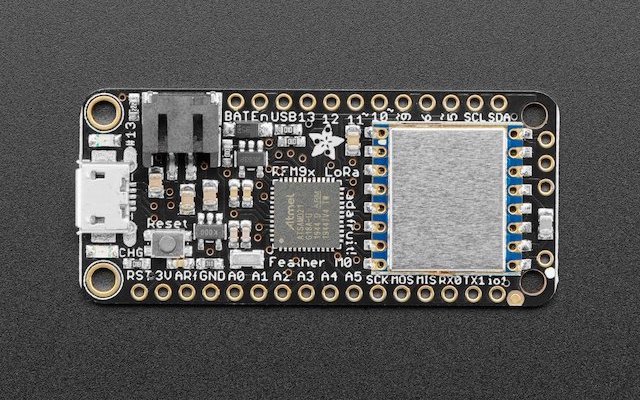Adafruit Feather M0 LoRa
Overview
The Adafruit Feather M0 Lora is a thin, light ARM development boards with an onboard battery connector and charger for 3.7 V lithium polymer batteries, charging status indicator and user LEDs, native USB connector, 20 I/O pins, and a LoRa radio module from Semtech.

Hardware
ATSAMD21G18A ARM Cortex-M0+ processor at 48 MHz
32.768 kHz crystal oscillator
256 KiB flash memory and 32 KiB of RAM
Battery connector and charger for 3.7 V lithium polymer batteries
Charging indicator LED
User LED
Reset button
Native USB port
SX127x LoRa radio
Supported Features
The adafruit_feather_m0_lora board configuration supports the following hardware features:
Interface |
Controller |
Driver/Component |
|---|---|---|
NVIC |
on-chip |
Nested vector interrupt controller |
Flash |
on-chip |
Can be used with LittleFS to store files |
SYSTICK |
on-chip |
Systick |
WDT |
on-chip |
Watchdog |
GPIO |
on-chip |
I/O ports |
USART |
on-chip |
Serial port |
I2C |
on-chip |
Inter-Integrated Circuit |
SPI |
on-chip |
Serial Peripheral Interface port |
USB |
on-chip |
USB device |
RADIO |
SPI |
LoRa radio |
Other hardware features are not currently supported by Zephyr.
The default configuration can be found in the Kconfig file boards/adafruit/feather_m0_lora/adafruit_feather_m0_lora_defconfig.
Connections and IOs
The Adafruit Feather M0 with LoRa radio module Learn site [1] has detailed information about the board including pinouts [2] and the schematic [3].
System Clock
The SAMD21 MCU is configured to use the 32.768 kHz external oscillator with the on-chip PLL generating the 48 MHz system clock.
Serial Port
The SAMD21 MCU has 6 SERCOM based USARTs. On the Adafruit Feather M0 with LoRa, SERCOM0 is the Zephyr console and is available on pins 0 (RX) and 1 (TX).
I2C Port
The SAMD21 MCU has 6 SERCOM based USARTs. On the Adafruit Feather M0 with LoRa, SERCOM3 is available on pin 20 (SDA) and pin 21 (SCL).
SPI Port
The SAMD21 MCU has 6 SERCOM based SPIs. On the Adafruit Feather M0 with LoRa, SERCOM4 is available on pin 22 (MISO), pin 23 (MOSI), and pin 24 (SCK).
USB Device Port
The SAMD21 MCU has a USB device port that can be used to communicate with a host PC. See the USB device support samples sample applications for more, such as the USB CDC-ACM sample which sets up a virtual serial port that echos characters back to the host PC.
LoRa Radio
The Semtech SX127x radio chip on the Adafruit Feather M0 with LoRa is attached to the SPI port (SERCOM4). Depending on the hardware version, 433MHz or 900MHz is supported.
Programming and Debugging
The Adafruit Feather M0 with LoRa ships with a BOSSA compatible SAM-BA bootloader. The bootloader can be entered by quickly tapping the reset button twice.
Flashing
Build the Zephyr kernel and the Hello World sample application:
west build -b adafruit_feather_m0_lora samples/hello_world
Connect the Adafruit Feather M0 with LoRa to your host computer using USB
Connect a 3.3 V USB to serial adapter to the board and to the host. See the Serial Port section above for the board’s pin connections.
Run your favorite terminal program to listen for output. Under Linux the terminal should be
/dev/ttyACM0. For example:$ minicom -D /dev/ttyACM0 -o
The -o option tells minicom not to send the modem initialization string. Connection should be configured as follows:
Speed: 115200
Data: 8 bits
Parity: None
Stop bits: 1
Tap the reset button twice quickly to enter bootloader mode
Flash the image:
west build -b adafruit_feather_m0_lora samples/hello_world west flash
You should see “Hello World! adafruit_feather_m0_lora” in your terminal.
